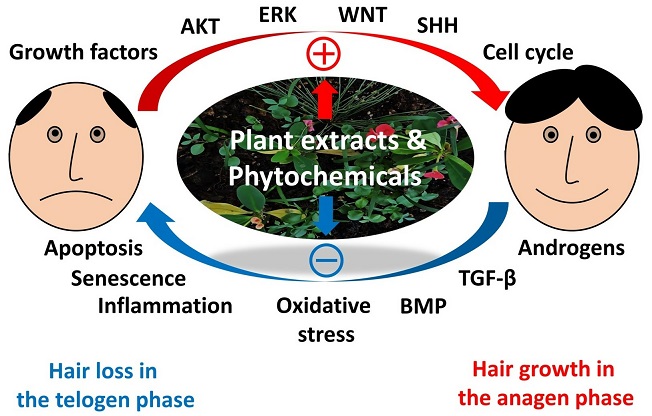Nikhil Prasad Fact checked by:Thailand Medical News Team May 27, 2024 1 year, 7 months, 2 days, 3 hours, 54 minutes ago
Herbs And Phytochemicals: Hair loss is a common concern that affects millions worldwide, impacting self-esteem and quality of life. While pharmaceutical treatments like minoxidil and finasteride are well-known, there is a growing interest in natural alternatives. Researchers from Kyungpook National University in South Korea have delved into the therapeutic potential of plant extracts and their phytochemicals in preventing and treating alopecia. This comprehensive review examines various plant-based solutions, highlighting their efficacy, mechanisms of action, and the scientific evidence supporting their use.
 Graphical Abstract - Herbs And Phytochemicals That Can Help Prevent Hair Loss Or Promote Hair Growth
Understanding Hair and Hair Loss
Graphical Abstract - Herbs And Phytochemicals That Can Help Prevent Hair Loss Or Promote Hair Growth
Understanding Hair and Hair Loss
Hair is a complex structure composed of keratin proteins and melanin pigments, growing from follicles located in the dermis. The hair cycle consists of three phases: anagen (growth), catagen (regression), and telogen (resting). Hair loss can result from genetic factors, hormonal imbalances, immune reactions, stress, poor nutrition, and certain medications. The transition from anagen to telogen is often associated with hair loss conditions such as androgenetic alopecia (male pattern baldness).
The Role of Plant Extracts in Hair Health
Plants produce a diverse array of bioactive compounds, known as phytochemicals, which have been utilized in traditional medicine for centuries. These compounds include phenolic compounds, terpenes, sulfur-containing compounds, and fatty acids. Recent
Herbs And Phytochemicals studies have shown that various plant extracts can enhance the survival and proliferation of dermal papilla cells, promote hair growth in hair follicles, and stimulate hair regrowth in animal models. Some plant extracts have even demonstrated hair growth-promoting effects in clinical trials.
Mechanisms of Action: How Plant Extracts Work
The therapeutic effects of plant extracts are attributed to their ability to modulate several cellular processes and signaling pathways:
-Cell Survival and Proliferation: Plant extracts promote cell survival and proliferation by upregulating growth factors such as IGF-1, VEGF, HGF, and KGF. These factors are crucial for inducing and extending the anagen phase of the hair cycle.
-Antioxidant and Anti-inflammatory Effects: Many plant extracts possess antioxidant properties that alleviate oxidative stress, a key factor in hair loss. They also exhibit anti-inflammatory effects, reducing the expression of pro-inflammatory cytokines and protecting hair follicles from damage.
-Hormonal Modulation: Some plant extracts inhibit the activity of steroid 5α-reductase, an enzyme that converts testosterone into dihydrotestosterone (DHT), a hormone associated with hair loss. By reducing DHT levels, these extracts help prevent androgenetic alopecia.
Signaling
Pathways: Plant extracts influence various signaling pathways involved in hair growth, including the AKT, ERK, WNT, and SHH pathways. These pathways play critical roles in cell proliferation, survival, and differentiation.
Scientific Evidence: In Vitro, Ex Vivo, and In Vivo Studies
Numerous studies have demonstrated the efficacy of plant extracts in promoting hair growth and preventing hair loss:
-In Vitro Studies: Research has shown that plant extracts like camellia (Camellia japonica) promote the proliferation of human follicle dermal papilla cells and enhance cell viability reduced by androgens.
Ex Vivo Studies: Extracts from plants such as Cucumis melo and Panax ginseng have been shown to promote hair shaft growth and prolong the anagen phase in organ-cultured hair follicles.
In Vivo Studies: Animal studies have highlighted the hair growth-promoting effects of plant extracts. For example, extracts from marine plants like Eucheuma cottonii and Sargassum fusiforme have demonstrated significant efficacy in promoting hair growth in mice models.
Clinical Trials: Human Evidence
Several clinical trials have evaluated the efficacy of plant extracts in promoting hair growth in humans. Products containing extracts from Thuja occidentalis, Oryza sativa, Curcuma aeruginosa, and other plants have shown promising results in increasing hair density and reducing hair loss. These trials underscore the potential of plant-based treatments as effective alternatives or complements to conventional hair loss therapies.
Phytochemical Components: The Active Ingredients
The efficacy of plant extracts is largely due to their rich phytochemical content. Key compounds include:
Phenolic Compounds: Flavonoids like kaempferol, quercetin, and myricetin are known for their antioxidant and anti-inflammatory properties.
Terpenes and Terpenoids: Compounds like 12-methoxycarnosic acid and ginsenosides have been shown to enhance cell proliferation and inhibit androgen receptor expression.
Sulfur-Containing Compounds: Sulforaphane and glucoraphanin from Brassica oleracea promote hair growth by enhancing cell survival and reducing oxidative stress.
Fatty Acids: Alpha-linolenic acid and linoleic acid from various plant extracts are effective in promoting hair growth and improving follicle health.
Future Directions: Towards New Therapies
The promising results from studies on plant extracts pave the way for the development of new, targeted therapies for alopecia. Future research should focus on:
-Detailed Mechanistic Studies: Understanding the specific molecular mechanisms by which plant extracts promote hair growth and prevent hair loss.
-Clinical Trials: Conducting more extensive and rigorous clinical trials to confirm the efficacy and safety of plant-based treatments in diverse populations.
-Formulation and Delivery: Developing optimized formulations and delivery systems to enhance the bioavailability and effectiveness of plant extracts.
Conclusion: Embracing Nature in Hair Care
The therapeutic potential of plant extracts in preventing hair loss and promoting hair growth is supported by a growing body of scientific evidence. These natural remedies offer a promising alternative for individuals seeking safer, more holistic approaches to hair care. As research continues to unveil the intricate mechanisms and benefits of phytochemicals, the future of hair loss treatment looks increasingly green.
The study findings were published in the peer reviewed journal: Molecules.
https://www.mdpi.com/1420-3049/29/10/2288
For the latest on
Herbs And Phytochemicals, keep on logging to Thailand Medical News.
Read Also:
https://www.thailandmedical.news/news/mit-and-harvard-researchers-develop-new-treatment-method-to-reverse-hair-loss-caused-by-alopecia-areata
https://www.thailandmedical.news/news/aesthetic-news-the-revolutionary-use-of-platelet-derivatives-in-regenerative-aesthetics
https://www.thailandmedical.news/news/yale-scientists-find-that-jak-inhibitors-such-as-tofacitinib,-ruxolitinib,-baricitinib-and-ritlecitinib-can-be-used-to-treat-alopecia-areata-hair-loss
https://www.thailandmedical.news/news/covid-19-news-decreased-growth-arrest-specific-6-gas6-and-saxl-plasma-levels-linked-to-hair-loss-in-post-covid-individuals
https://www.thailandmedical.news/news/new-british-study-shows-that-sexual-dysfunction-and-hair-loss-are-joining-fatigue-and-brain-fog-as-leading-long-covid-issues-
https://www.thailandmedical.news/news/researchers-from-icahn-school-of-medicine-on-the-way-to-finding-treatment-to-prevent-hair-loss-and-baldness
https://www.thailandmedical.news/news/breaking-covid-19-symptoms-study-by-indiana-university-and-covid-19-survivors-group-claims-of-sars-cov-2-associated-hair-loss
https://www.thailandmedical.news/news/new-breakthrough-stem-cell-treatment-for-hair-loss
https://www.thailandmedical.news/news/health-tips-for-hair-loss-prevention
https://www.thailandmedical.news/news/experimental-drug-may-reverse-hair-loss-hair-whitening-and-skin-inflammation
